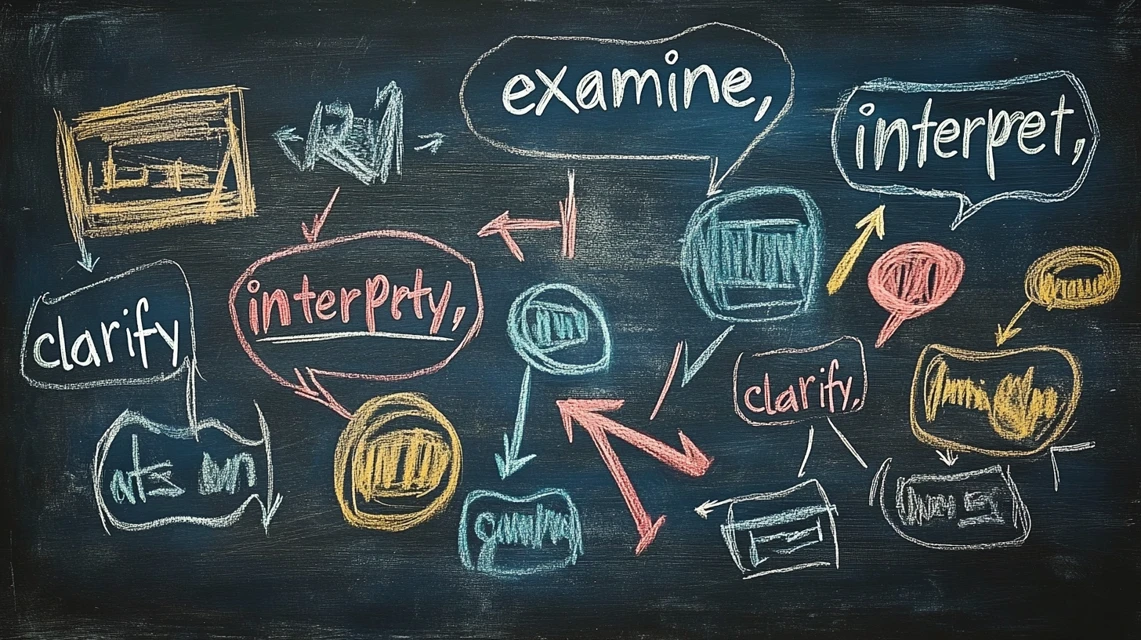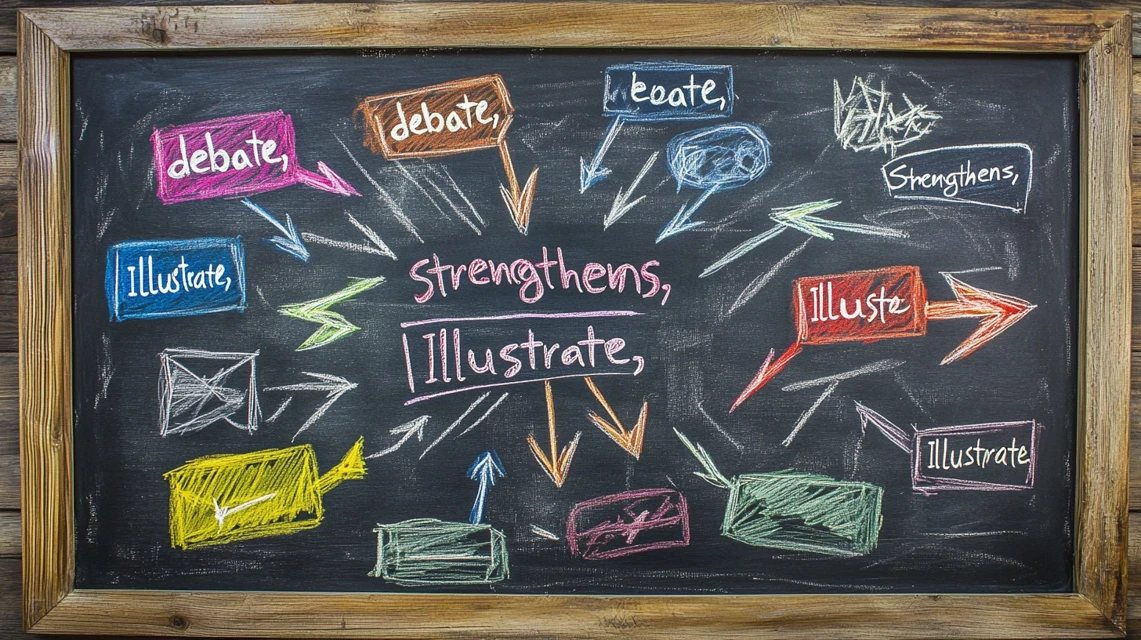I struggled with essays before. My points didn’t make sense to others. Then, I found analytical verbs.
They helped me write better. These words made my ideas clear. My teachers saw the change.
My essays got better. Now I want to help you too. I’ll tell you about these useful words. I’ll give you examples.
I’ll show you how to use them. Let’s learn this step by step. It’s simple once you know how.
What is an Analytical Verb

I find that analytical verbs are simply action words that show thinking skills. They help me understand and explain information better.
When I write essays or do homework, I use these words to make my points clear.
For example, when I want to make sense of something, I might say “examine” instead of just “look at.”
These words tell my reader exactly what I’m doing with the information. They’re like tools in my writing toolkit.
Every time I use them, I show that I’m not just repeating facts – I’m actually thinking about what they mean.
They make my writing sound more professional but in a way that’s still easy to understand.
Some Examples of Analytical Verbs
- Alludes to
- Analyzes
- Asserts
- Balances
- Builds
- Bolsters
- Categorizes
- Characterizes
- Clarifies
- Classifies
- Collates
- Compares
- Concludes
- Confirms
- Contrasts
- Correlates to
- Critiques
- Debates
- Defends
- Differentiates
- Distinguishes
- Elaborates
- Emphasizes
- Evaluates
- Explains
- Expands
- Highlights
- Identifies
- Integrates
- Interprets
- Justifies
- Proposes
- Relates
- Reinforces
- Reveals
- Strengthens
- Substantiates
- Suggests
- Supports
- Underlines
- Analyze
- Assess
- Compare
- Contrast
- Critique
- Define
- Evaluate
- Explain
- Interpret
- Investigate
- Justify
- Prove
- Synthesize
- Argue
- Categorize
- Classify
- Describe
- Demonstrate
- Distinguish
- Elaborate
- Establish
- Estimate
- Formulate
- Identify
- Illustrate
- Infer
- Integrate
- Predict
- Propose
- Relate
- Represent
- Resolve
- Review
- Summarize
- Trace
- Validate
- Verify
- Deduce
- Differentiate
- Discuss
- Elucidate
- Examine
- Highlight
- Indicate
- Observe
- Question
- Reconcile
- Refute
- Specify
- Suggest
- Strengthen
- Assert
- Elicit
- Facilitate
- Defend
- Create
- Elevate
- Convey
- Support
- Characterize
- Advocate
- Present
- Correlate
- Expand
- Reveal
- Portray
- Reinforce
- Clarify
- Collate
- Provoke
- Perpetuate
- Emphasize
- Implement
- Show
- Respond
- Confirm
- State
- Substantiate
- Imply
- Generate
- Recall
- Conclude
- Persuade
- Inform
- Articulate
- Express
- Bolster
- Frame
- Allude
- Underline
- Promote
Some Example Sentences of Analytical Verbs

- We need to break down the data to find a solution to the problem.
- She will evaluate the situation before making a decision.
- Look for similarities between the economic growth of the two countries.
- He will highlight the differences between the philosophies of these two political thinkers.
- The professor asked the students to provide a detailed analysis of the article.
- Can you explain the exact meaning of ‘analytical thinking’?
- We will assess the effectiveness of the new strategy after six months.
- Can you clarify why this theory is important?
- We have been asked to provide the meaning of the results of the survey.
- The police will conduct a systematic inquiry into the circumstances of the incident.
- The scientist provided extensive research to support his hypothesis.
- She needs to back up her theory with solid evidence.
- We were asked to combine the key ideas from the readings.
- The philosopher presents the argument that morality is subjective.
- Can you sort these items according to their size?
- The researchers divide the specimens into several groups.
- Please explain the main events in the novel.
- Can you show how the formula works?
- It’s important to identify the difference between correlation and causation.
- Could you expand on your previous statement?
- The study aims to establish a link between diet and disease.
- We need to estimate the potential costs of the project.
- The team will create a new plan for the campaign.
- She was able to recognize the key trends in the market.
- Can you provide an example to clarify your point?
- From the data, we can assume a positive trend.
- The goal is to incorporate these concepts into our daily practices.
- Based on the current situation, can you predict the outcome?
- The committee will introduce new guidelines for the process.
- How does this chapter connect to the overall theme?
- This painting reflects the struggle of the workers.
- The scientist was able to resolve the issue using a new approach.
- Please go over the documents before the meeting.
- Can you outline the main points of the article?
- We need to trace the history of this idea to understand its origin.
- The experiment will confirm the hypothesis.
- We must check the accuracy of the information.
- From the evidence, we can conclude that the policy has been effective.
- Can you point out the difference between these two concepts?
- We will talk about the implications of the research findings.
- The professor tried to clarify his theory to the class.
- The paper will look at the impact of climate change on agriculture.
- The report emphasizes the main challenges facing the industry.
- The results show a significant increase in sales.
- In the experiment, they noted a change in the subject’s behavior.
- It’s crucial to question the assumptions behind the argument.
- We need to reconcile the conflicting evidence in these studies.
- The author attempts to disprove the criticism against his theory.
- Please detail the resources you used for the project.
- The evidence indicates that the intervention was successful.
- The researcher provided a detailed review of the new study.
- The author illustrates the impact of social media on youth culture.
- The lawyer defended her client’s actions based on the new evidence.
- The teacher clarified the meaning of the complex theory for the students.
- The data suggests a significant correlation between sleep and academic performance.
- The report emphasizes the importance of early intervention in mental health.
- The artist portrays the struggle of identity in her latest work.
- The study confirms that the new technology improves efficiency in the workplace.
- The speaker highlighted the key issues regarding climate change in her presentation.
- The scientist expanded on the implications of the recent findings.
- The historian relates the current political climate to past social movements.
- The article advocates for more inclusive policies in the education system.
- The analysis of the text revealed underlying themes of power and control.
- The research findings reinforce the need for stricter regulations in the industry.
- The film underscores the importance of family and community support.
- The psychologist suggested a different approach to understanding human behavior.
- The study presents new evidence on the relationship between diet and health.
- The teacher implied that students should revise their essays before submitting them.
- The report proposes a new framework for managing urban development.
- The findings corroborate earlier studies on the effects of exercise on mental health.
- The report contrasts the benefits of renewable energy versus fossil fuels.
- The analyst identified trends that could influence future market behavior.
- The study generates important insights into the nature of consumer decision-making.
- The novel conveys deep emotional truths about love and loss.
- The coach facilitated a discussion on team dynamics and performance.
- The professor criticized the methodology used in the previous research.
- The artist alluded to historical events in her work, giving it deeper meaning.
- The data supports the argument that increased funding improves educational outcomes.
- The editor reviewed the manuscript and suggested several changes.
- The study validates the hypothesis that early exposure to music enhances cognitive abilities.
Conclusion
I learned about analytical verbs when my writing needed help.
Now I want you to use them too. These words make writing better. They show clear thinking.
Try simple ones like “explain” or “show” first. The list I shared will help you pick the right words.
Your essays will be clearer. Your points will be stronger.
Your teachers will see the change. Use my examples as a guide. Start small. Build up slowly. Good writing is that simple.
Pick the right words. Make your point. That’s all you need.


















